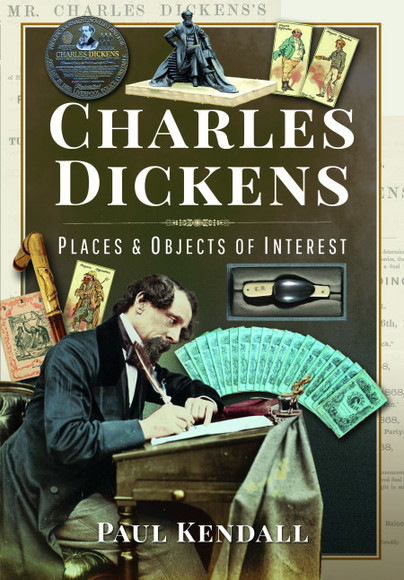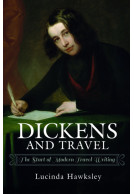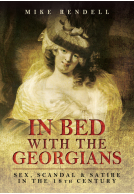Dickens and Travel (Hardback)
The Start of Modern Travel Writing
Imprint: Pen & Sword History
Pages: 280
Illustrations: 32 black and white illustrations
ISBN: 9781526735638
Published: 15th June 2022
In the press!
How Glencoe scared the Dickens out of novelist as he toured the world's wonders - Ross Crae, The Scottish Sunday Post
(click here for international delivery rates)
Order within the next 3 hours, 35 minutes to get your order processed the next working day!
Need a currency converter? Check XE.com for live rates
| Other formats available | Price |
|---|---|
| Dickens and Travel Paperback Add to Basket | £14.99 |
| Dickens and Travel ePub (20.0 MB) Add to Basket | £6.99 |
From childhood, Charles Dickens was fascinated by tales from other countries and other cultures, and he longed to see the world. In Dickens and Travel, Lucinda Hawksley looks at the journeys made by the author – who is also her great great great grandfather.
Although Dickens is usually perceived as a London author, in the 1840s he whisked his family away to live in Italy for year, and spent several months in Switzerland. Some years later he took up residence in Paris and Boulogne (where he lived in secret with his lover). In addition to travelling widely in Europe, he also toured America twice, performed onstage in Canada and, before his untimely death, was planning a tour of Australia.
Dickens and Travel enters into the world of the Victorian traveller and looks at how Charles Dickens’s journeys influenced his writing and enriched his life.
"All in all, Dickens and Travel offers a rich and entertaining overview of Dickens as a traveler and travel writer. It will please any readers interested in that lesser-known aspect of Dickens’s writing. From end to end, this book gives us the impression of travelling with Dickens to the numerous places he visited during his life. And we get a real feel of what it was like to travel and sojourn in Britain and abroad in the Victorian period."
Dickens Quarterly - March 2024 issue
Lucinda Dickens-Hawksley features at Dickens on the Strand Festival! Read more here
Click2Houston.com
Lucinda Dickens-Hawksley judges the Dickens On The Strand short story contest in Galveston, USA.Read more here
Chron.com
As featured in the Monadnock Leger-Transcript.
Monadnock Leger-Transcript
See Lucinda at the New England Dickens festival 2023.
Article: 'Encountering Charles Dickens'
Oremus Magazine
A lovely volume which I certainly recommend to Dickens fans and also to those interested in travel writing in his time (or even indeed its evolution)!
NetGalley, Mallika Ramachandran
Article: Dicken's Grand Tour
Times Literary Supplement
Highlight: 'Hawksley explores the novelist's almost compulsive fascination with the need to be elsewhere... a book that ranges from domestic jaunts to international voyages. Along the way she also maps the connections between travelling and wellbeing for a novelist prone to bouts of melancholic restlessness, and whose imagination required constant stimulation.'
This was a very interesting book which I thoroughly enjoyed reading. Everyone knows Dickens book but do you know the lengths he went to to get research and inspiration? Well this book definitely has that and more. The book has great detail about his travels. And I Learnt so many interesting things about him. I especially loved the extent he would go to to get inspiration including trying to visit an orphanage without being recognised. Which was increasingly difficult as he became more well known. I especially loved reading about his trip to a volcano. This book was obviously extremely well researched and flowed brilliantly. Which ment I easily became engrossed in this book and finished it in one day. If you are a fan of classic writing or history of dickens time then this book is definitely for you. I really do recommend reading it. I don't even think any stone was left unturned when the author wrote this book.
NetGalley, Claire Lavin
So much praise goes out to the author and publishers for creating this brilliant biography of such a fascinating man that certainly held my attention throughout.
Rating: 5 out of 5 stars
NetGalley, Diane Prokop
While the mind and imagination of Charles Dickens has always fascinated me, conversely, stories of travel and faraway places captivated the world beloved author.
In her newly released, Dickens and Travel: The Start of Modern Travel Writing, Lucinda Hawksley details her great-great-great-grandfather’s jaunts across the United Kingdom, Europe and North America.
Hawksley describes Dickens as “a writer with the soul of a traveler” and helps us get to know him and his characters better, via his letters, articles and travelogues - American Notes and The Unconventional Traveler - making the beloved classics all the richer for the reader.
As a young freelance journalist hungry to make a name for himself in the early 1830’s, he followed the story wherever it led him, no matter the danger of harrowing stagecoach rides, no matter the weather, its horses being willed to continue on ever faster to make his printing deadline.
The journeys became part of his research. Names and observations of his fellow travelers became fodder for his incredible storytelling, which we see continues as Hawksley sheds light on Dickens’s summer holidays with wife Catherine and their children in Broadstairs, visits to Cornwall, travels to Ireland, Scotland, Paris and Italy, as well as the United States and Canada.
We learn what, in his travels, excited the author - on Paris, of which he wrote, “My eyes ached and my head grew giddy, as novelty, novelty, novelty; nothing but strange and striking things; came swarming before me.” And what infuriated him - slavery, of which he wrote in American Notes, on leaving Richmond, Virginia, “I went upon my way with a grateful heart that I was not doomed to live where slavery was,” inhumane conditions in prisons, and spitting, nicknaming Washington DC, “the head-quarters of tobacco-tinctured saliva.”
This is not the first time Hawksley has written about her forefather. Previous books include Dickens and Christmas, Charles Dickens: The Man, The Novels, The Victorian Age, as well as Dickens’s Artistic Daughter Katey: Her Life, Loves & Impact.
Hawksley makes clear in the current installment the correlation of Dickens’s travels inspiring his writing and his writing inspiring his contemporary authors.
While I knew Dickens had visited my hometown of Philadelphia and met with Edgar Allan Poe at a time when the city was the publishing capital of the country, I was especially delighted to learn more about their 1842 meeting and the influence Dickens and his raven Grip, which had been featured in Barnaby Rudge, had had on Poe.
I thoroughly enjoyed reading Dickens and Travel: The Start of Modern Travel Writing, much of the time with a smile on my face. Fans of Dickens and all those who travel will too.
Great book, great writing.
The History Fella
Read the full review here
Dickens’ travels around the British Isles, Europe and America arranged by place and mostly chronologically. Lots of excerpts of his writing from his nonfiction, novels and letters are included making this an enjoyable read for any Dickens fan.
NetGalley, Janelle Womsley
Rating: 5 out of 5 stars
NetGalley, Brenda Carleton
Beloved writer Charles Dickens was passionate about travel and gleaned inspiration from his travels for his books, many of which are mentioned here. He is...and always will be...a favourite author of mine so it was an honour to learn more about his life through his own eyes with many excerpts from letters and his travel books Pictures from Italy, American Notes and Uncommercial Traveler. He was an advocate for the rights of children and abhorred slavery and executions. His firsthand experience as a child living in a debtor's prison and forced to provide for the family by working at the age of twelve contributed greatly to his writing.
Dickens enjoyed traveling with his wife Catherine and their children, with friends and alone. His family even lived in various places in Europe to become immersed in the culture and to learn more about life. As an ex pat, I understand this very well...travel is unlike any other education and I have had the fortune to visit so many of the places Dickens did. He wrote about his love for Paris, kindness of Canadians, disgust for slavery in Richmond in America, extols free education in Cincinnati, pure magic of Venice, his dislike of Naples which he called "dirty", gradually falling in love with Rome, pride of his wife's Scottish heritage, his fondness of Brighton and despair of abusive boarding school such as that at Barnard Castle.
Not only did Dickens write about experiencing different cultures but also the oft harrowing physical journeys themselves including train accidents, horse/carriage travails, seasickness and a ship without beds. He wrote beautifully and with wit and always captured the emotions and feeling of a place in his words. He also traveled to give public talks. I would have been at the edge of my seat in awe! If only he had lived longer than only 58 years.
This magnificent book written by Dickens' great, great, great granddaughter, also a traveler, is an absolute must for fans of Charles Dickens. I learned more about his magnetic character and compassionate personality as well as his childhood, adventures as a journalist, family life and his marriage breakdown.
My sincere thank you to Pen & Sword and NetGalley for the privilege of reading this beguiling, astonishing and engrossing book.
As featured in the article: 'From Paris to Pompeii: How Dickens and his family viewed the world on their own grand tour.'
The Sunday Times (Dundee)
Rating: 5 out of 5 stars
NetGalley, Nancy A. Bekofske
Travel writer and great-great-great-granddaughter of Charles Dickens, Lucinda Hawksley has written about her illustrious ancestor, including Dickens and Christmas. Her newest book explores Dickens as a travel writer. “Almost everywhere I have travelled,” she shares, “I have discovered a connection with my great-great-great grandfather.”
It’s been perhaps forty years since I read a biography on Dicken, and I had no recollection of his extensive travels across Europe. I was aware of his visits to America. I will admit, I have not read ALL of Dickens’ books, although a complete set has been on my shelf for almost fifty years. I was surprised to learn how many of his books reflect his experience abroad.
When depression hit him, his wanderlust inspired him to go abroad, not only on tours but to take up residence for a lengthy time in Italy and Paris. Hawksley draws from Dickens’ letters, articles, and books to provide quotes about his experiences. I loved reading them, enjoying Dickens’ humor and vivid descriptions.
Dickens traveling began in England when he was a journalist seeking to cover stories, “adrenaline-fueled travels,” Hawskely calls them. “Belated on miry by-roads, towards the small hours, forty or fifty miles from Long, in a wheelless carriage, with exhausted horses and drunken postboys,” Dickens wrote, arriving in time to turn in his story to the printers. The roads were muddy and rough, the countryside held robbers. His experiences informs The Posthumous Papers of the Pickwick Club.
What a prodigious walker Dickens was! Day-long walks in all kinds of weather. Consider Dickens’ description of one day in Scotland: “To-day we have had a journey of between 50 and 60 miles, though the bleakest and most desolate part of Scotland, where the hill-tops are still covered with great patches of snow, and the road winds over steep mountain-passes, and on the brink of deep brooks and precipices.” Another day it took four hours to walk sixteen miles in a gale, his wife Catherine’s timely removal from the carriage coming before it was caught up in a flood.
Everywhere he went, Dickens toured the prisons and noted the conditions of the poorest neighborhoods. He was particularly appalled by slavery. Southerners persisted in asking him his feelings about their ‘domestic institution,’ and he told them what he thought. He didn’t finish his American tour, turning back North.
“Party feeling runs high,” he wrote about 1842 America, “the great constitutional feature of this institution being, that directly the acrimony of the last election is over, the acrimony of the next one begins…” (Some things never change!)
One American custom that disgusted him was spitting. He describes floors slick with it, “the stone floor looks as if it were paved with open oysters.”
Dickens met many American writers, including a young Edgar Allan Poe, who was inspired by Dicken’s pet raven Grip when he wrote his famous poem The Raven. Grip ended up in the Philadelphia Free Library! In Washington D. C. he dined with John Quincy Adams, noting that “Adams is a fine old fellow-seventy-six years old, but with most surprising vigor, memory, readiness, and pluck.” He felt sympathy for the Native Americans, reduced to assimilation for survival, and he was appalled by the destruction of the country’s primal forests.
Dickens wrote, “Canada has held, and always will retain, a foremost place in my remembrance.”
Lengthy quotations from Dickens on Italy describes its beauty and the discomfort: “…but in the day you must keep the lattice-blinds close shut, or the sun would drive you mad; and when the sun goes down you must shut up all the windows or the mosquitoes would tempt you to commit suicide.” He also noted “the fleas, whose size is prodigious, and whose name is Legion, and who populate the coach-house to the extent that I daily expect to see the carriage going off bodily, drawn by myriads of industrious fleas in harness.”
He especially loved Paris, France, “the most extraordinary place in the world.” He met Victor Hugo, Alexander Dumas, and George Sand. He reveled in his fame, while Catherine became more unhappy. They had been happy for many years, but after many children, and becoming stout, she was losing him. Dickens fell in love with actress Ellen Ternan, who was his daughter’s age. Catherine moved out, and Dickens set Ellen up in an apartment with her mother.
He made a second trip to America to raise money, but his health was poor during this time, with a cough and a swollen foot, unable to sleep or eat, dependent on laudanum. His hoped for trip to Australia and New Zealand never happened; Dickens died at age 58.
I so enjoyed this book and I have to wonder why I never read his travel books. It is something to look forward to.
Rating: 5 out of 5 stars
NetGalley, Michelle Kidwell
Written by a descendant of Charles Dickens, his Great Great granddaughter Lucinda Hawksley, Dickens and Travels gives us a unique glimpse not only of his travels, but how Dickens helped to shape the modern age of travel writing.
About Lucinda Hawksley
LUCINDA HAWKSLEY has written more than twenty books, including biographies of the Victorian artists Lizzie Siddal, Kate Perugini (née Dickens) and Princess Louise. Her other titles include Dickens and Christmas, Bitten by Witch Fever, Letters of Great Women and March, Women, March.
As a travel writer and former travel editor, Lucinda has long been fascinated by Charles Dickens’s travels and the ease with which he moved around the globe – as well as why this is such a little-known aspect of Dickens’s life. Lucinda is also a broadcaster, a public speaker, and a Patron of the Charles Dickens Museum in London.
The death of Charles Dickens
9th June 1870
Author Charles Dickens died on 9 June 1870, aged only fifty-eight. He wrote fifteen novels between 1836 and 1870, including some of the most famous works in the English language, such as Oliver Twist and the novella A Christmas Carol.
Charles Dickens Places and Objects of Interest (Hardback)
Few writers have had a greater impact upon British society than Charles Dickens. His stories, and, in particular, his many memorable characters, highlighted the life of the forgotten poor and disadvantaged within society at a time when Britain was the leading economic and political power in the world. Dickens’ portrayal of the poor, such as Oliver Twist daring to ask for more food in the parish workhouse, and Bob Cratchit struggling to provide for his family at Christmas, roused much sympathy and an understanding of the poor and the conditions in which they lived. This led to many people founding…
By Paul KendallClick here to buy both titles for £47.00


















